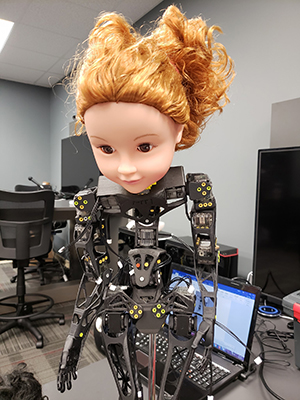2018
Poppy the Robot comes to life as HCC builds its first robot
Oct 3, 2018
 Months of planning and hard work have paid off for a Houston Community College tech team that has built the college's first humanoid robot.
Months of planning and hard work have paid off for a Houston Community College tech team that has built the college's first humanoid robot.
Poppy the Robot was constructed piece by piece on a 3D printer at the HCC West Loop Campus Digital and IT Innovation Lab by a team of students and faculty. The project represents collaboration between HCC’s Digital & Information Technology and Advanced Manufacturing centers of excellence.
“Poppy has really opened our eyes in understanding how humanoids and artificial intelligence can work and play a part in the community college,” said Sean Otmishi, dean of the HCC Digital & Information Technology Center of Excellence. “Less than a year ago, building Poppy would have been really expensive and it was not cost-effective to do. But now that Poppy’s here, we’re opening up opportunities for new programs.”
Plans are in the works for a Level II certificate and Associate of Applied Sciences degree in robotics, Otmishi said.
Building a robot using 3D printing is a relatively easy undertaking if materials, and patience are in ample supply. The first step is 3D-printing the parts layer by layer, then attaching the frame and torso. “Now that Poppy is completely built, the programing will start with adding power, a CPU and neural network, along with outer skin.” Otmishi said.
The experience of bringing Poppy to life will be invaluable to the students on the team. “It’s pushing the envelope on robotics, artificial intelligence and machine learning and it will affect all industries,” said HCC Professor George Brown. “We have the opportunity to expose students to what’s available to them so they can get into it and begin using it to create something useful.”
Today’s robots do just about everything from assisting with disaster recovery, to painting cars, assembling products and handling materials or packaging. “Young people have an opportunity to experiment with sophisticated robots and sophisticated disciplines like machine learning and artificial intelligence,” Brown said. “It gives them an opportunity to play with their thesis in trying to see if the sensors work and were programmed properly.”
For more information about the Digital & Information Technology Center of Excellence, visit hccs.edu/digital.
